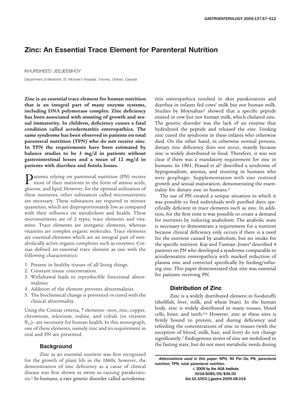Zinc: An Essential Trace Element for Parenteral Nutrition
October 2009
in “
Gastroenterology
”

TLDR Zinc is crucial for nutrition, especially in patients with specific health conditions, and requires careful supplementation and monitoring.
The document emphasized zinc's critical role in human nutrition and its necessity in parenteral nutrition (PN), particularly for patients with specific clinical conditions like gastrointestinal losses, burns, and critical illness. It recommended zinc supplementation of 3-4 mg/day for patients without gastrointestinal losses and up to 36 mg/day for burn patients to reduce infections. The document highlighted the challenges in monitoring zinc status, noting that urine zinc levels were unreliable and suggesting the use of multiple clinical parameters instead. It also discussed the interaction between zinc and copper, the impact of EDTA-containing propofol on zinc excretion, and the potential of using C-reactive protein (CRP) as a proxy for monitoring zinc status during infections. The need for further research on zinc supplementation's effects on infection rates and the risks of long-term zinc toxicity in home PN patients was emphasized.



